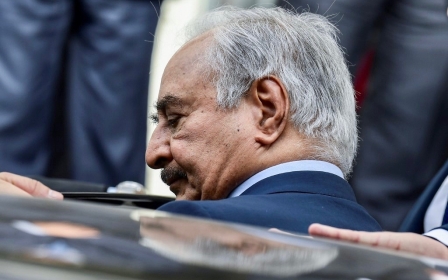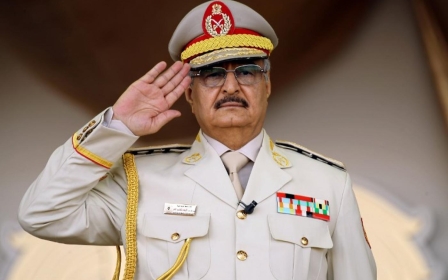Libya's Haftar agrees to lift oil blockade with conditions

Eastern Libyan commander Khalifa Haftar announced on Friday a conditional lifting of an eight-month-long blockade on oilfields and ports maintained by his forces.
"We have decided to resume oil production and export on condition of a fair distribution of revenues" and guarantee they "will not be used to support terrorism," he said on television.
Pro-Haftar groups supported by the Petroleum Facilities Guard blockaded key oilfields and export terminals on 17 January to demand what they called a fair share of hydrocarbon revenues.
The blockade, which has resulted in more than $9.8bn in lost revenue, according to Libya's National Petroleum Company (NOC), has exacerbated electricity and fuel shortages in the country. The NOC, which operates Libya's energy sector, said overnight it would not lift force majeure on exports until oil facilities were demilitarised.
Dressed in his military uniform, Haftar said the command of his forces had "put aside all military and political considerations" to respond to the "deterioration of living conditions" in Libya, which has Africa's largest oil reserves.
Stay informed with MEE's newsletters
Sign up to get the latest alerts, insights and analysis, starting with Turkey Unpacked
Meanwhile, in Tripoli, the deputy prime minister of the Government of National Acctord (GNA), Ahmed Maiteeg, issued a statement immediately after Haftar's speech also saying it "had been decided" to resume oil production and adding this would involve a new committee to oversee revenue distribution.
The committee would coordinate between the two sides to prepare a budget and transfer funds to cover payments and deal with the public debt, he said.
GNA Prime Minister Fayez al-Sarraj said on Wednesday he planned to step down by the end of October and analysts have said this would lead to political jockeying among other senior figures in Tripoli to succeed him.
However, neither Haftar nor Maiteeg addressed the presence of the commander's Libyan National Army and allied foreign forces in oil production and export facilities, which NOC has said must be withdrawn to ensure the safety of its staff before resuming output.
Turkish President Recep Tayyip Erdogan said on Friday Turkey was upset that Sarraj intends to resign next month and Ankara may hold talks with his government on the issue in the coming week.
"A development like this, hearing such news, has been upsetting for us," Erdogan told reporters in Istanbul, adding that Turkish delegations may hold talks with Sarraj’s government in the coming week.
"With these meetings, God willing we will turn this issue towards the direction it needs to go," he said.
Protests
Haftar's announcement comes after hundreds of Libyans protested last week in the eastern city of Benghazi, one of Haftar's strongholds, and other cities over corruption, power cuts and shortages in petrol and cash.
Protesting peacefully at first, protesters on Sunday set fire to the headquarters of the parallel eastern government in Benghazi and attacked the police station in al-Marj.
Police officers fired live ammunition to disperse them in al-Marj, leaving at least one dead and several wounded, according to witnesses and the UN mission in Libya.
Libya has been in chaos since a Nato-backed uprising toppled and killed longtime dictator Muammar Gaddafi in 2011.
The country's oil revenues are managed by the NOC and the central bank, both based in Tripoli, which is also the seat of Libya's internationally recognised GNA administration.
Haftar runs a rival administration based in the country's east.
The commander, who has the backing of Egypt, the United Arab Emirates and Russia, launched an offensive against Tripoli in April last year.
After 14 months of fierce fighting, pro-GNA forces, backed by Turkey, expelled his troops from much of western Libya and pushed them to Sirte, the gateway to Libya's rich oil fields and export terminals.
Middle East Eye delivers independent and unrivalled coverage and analysis of the Middle East, North Africa and beyond. To learn more about republishing this content and the associated fees, please fill out this form. More about MEE can be found here.




